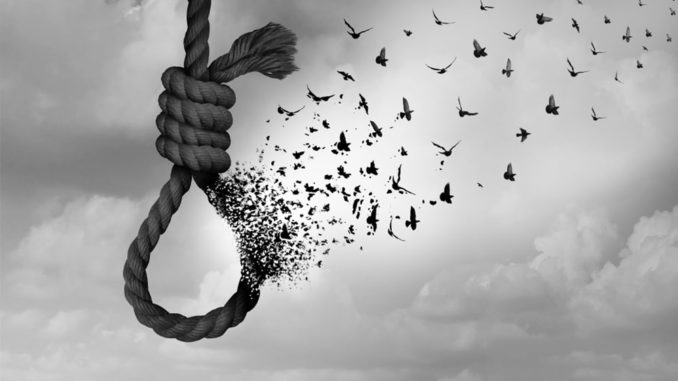
Mental illness is quietly chipping away the lives of many Nigerians unnoticed. There are several types of this health challenge – from common disorders that affect tens of millions of people such as depression and acute anxiety to addiction, total insanity, among others.
Yes, when summed up, the number of deaths directly or indirectly linked to mental disorder could double those being recorded from either the most dreaded HIV-AIDS or Tuberculosis, and even malaria that has remained an untamed tormentor-in-chief of many households across Nigeria.
Apart from the suicide bombers regularly unleashed on hapless individuals by Boko Haram insurgents, such mental health-related deaths include avoidable road accidents that continue to claim many lives as a result of the poor psychological condition of individuals behind the wheels.
The recent surge in cases of suicide, which is one of the mental disorders, with not less than 10 incidents reported in the media in May 2019 alone, and the number of psychiatric patients that now roam the streets across Nigeria, only appears to be a mere tip of the iceberg on the challenges associated with mental health which the country is yet to come to terms with.
It is no longer news that many young Nigerians are fast developing a passion for substance abuse. There is growing poverty and frustration in many families amid overwhelming challenges, rising unemployment rate ( at about 20 per cent), societal pressure, among others. These result in depressive disorder, a major detonator of full-blown madness, incoherent behaviour or suicide.
The scores of suicides recorded recently, according to reports, were made possible by a popular brand of pesticide, snipper. Some victims also hanged themselves, others jumped into rivers while drug overdose was not ruled out in a few cases.
Hardly a week passes now without a person attempting or committing suicide in Nigeria with most of such incidents missing out on the pages of newspapers as some affected families will prefer to keep mute because of the stigma attached to such dishonourable death.
But despite such mentality, many reported suicide cases like the University of Ibadan lecturer, who took his life on April 6, 2019, after an unfulfilled dream of completing his PhD programme; the one committed by a worker in Kogi State over alleged nonpayment of salary, and the over six reported cases of undergraduate suicides in April 2019 only succeeded in eliciting momentary frenzy across the country.
Some other widely reported suicide cases include that of a 100-level student of Kogi State University, Ayingba, who was jilted by her boyfriend and decided to end her life by taking a pesticide, and another year one student of Chemical Engineering at the University of Port Harcourt, Rivers State, who also decided to say bye to the world by drinking two bottles of the deadly pesticide.
The list also includes an 18-year-old found dead in her room in Aluu, a community in Rivers State; a 26-year-old hairdresser in Lagos who ended her life after her boyfriend quit the relationship; and a 17-year-old boy in Jos, reported to have sipped pesticide over failure in a university entrance examination. There have also been two reported (separate) cases of pastors in Abuja and Lagos who got depressed over personal challenges and decided to end their lives.
Advertisement
RIPAN Campaign AD
The issue of suicide is not peculiar to Nigeria. In fact, no country can successfully claim to have discovered the magic to totally uproot such deaths from its shores. According to the World Health Organisation, about 800,000 people die every year through suicide. Nigeria ranked 67th in the world based on the number of suicides.
But while many nations have discovered the importance of mental health by setting up functional systems to at least mitigate the number of incidents through proactive actions, Nigeria which is ranked number one in West Africa in suicide rate has no clear cut programmes or law to address the increasing scourge.
Nigeria, which still relies on a colonial framework (Lunacy Act of 1958) as the only law that has anything connected to mentally unstable persons, with only a few psychologists and an intangible number of qualified psychiatric specialists, is still folding its hands while an increasing number of its citizens are fast killing themselves through suicide act.
Just recently, the federal government said it had expended N500 billion on its social investment programme. The irony of it all is that not even a dime in such momentous intervention was dedicated to any issue related to mental health. The only few psychiatric hospitals in the country are in shambles even as one can hardly find any rehab centres or qualified psychologists to channel the problem of mental health challenge.
International Development Partners and donors have not also done enough on the issue of addressing mental related illness, which is currently affecting both the rich and poor, the young and old, through suicide and other means.
Nigeria must not wait for more of its citizens to take their own lives before coming up with a workable mechanism to stem the tide. Suicide is gaining more ground, it is spreading like a bushfire and threatening to ‘embrace’ more people.
Ndueso Eno is a Medical Sociologist and the COO of Ikang Relief Services Network.
PremiumTimes
END

Be the first to comment